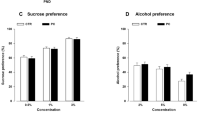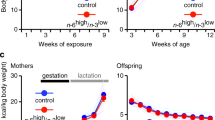Abstract
Background/Objectives:
Energy-dense food exposure and stress during development have been suggested to contribute to obesity and metabolic disorders later in life. Although these factors are frequently associated, the effects of their combination have not yet been investigated. In this study, using an animal model, we examined the long-term impact of maternal high-fat diet (HFD) and early-life stress (ELS) on energy homoeostasis control and food motivation.
Methods:
Body weight growth under HFD, adipose tissue, body weight control in response to fasting and refeeding, food-motivated behaviour and mesolimbic dopamine function were examined in adult male offspring exposed to maternal HFD (during gestation and lactation) and/or ELS (maternal separation 3 h per day from postnatal day 2 to 14).
Results:
Maternal HFD or ELS alone had no significant effect on offspring body weight; however, the combination of these factors exacerbated body weight gain when animals were exposed to HFD after weaning. There are no other significant combinatory effects of these perinatal events. In contrast, independently of the maternal diet, ELS disrupted body weight control during a fasting–refeeding procedure, increased adipose tissue mass and altered lipid metabolism. Finally, maternal HFD and ELS both resulted in exacerbated food-motivated behaviour and blunted dopamine release in the nucleus accumbens during palatable food consumption.
Conclusions:
We report a synergistic effect of perinatal HFD exposure and stress on the susceptibility to gain weight under HFD. However, ELS has a stronger impact than maternal HFD exposure on energy homoeostasis and food motivation in adult offspring. Altogether, our results suggest a programming effect of stress and nutrition supporting the hypothesis of the developmental origin of health and disease.
This is a preview of subscription content, access via your institution
Access options
Subscribe to this journal
Receive 12 print issues and online access
$259.00 per year
only $21.58 per issue
Buy this article
- Purchase on Springer Link
- Instant access to full article PDF
Prices may be subject to local taxes which are calculated during checkout





Similar content being viewed by others
References
Avena NM, Gold MS . Food and addiction—sugars, fats and hedonic overeating. Addiction 2011; 106: 1214–1215.
Egecioglu E, Skibicka KP, Hansson C, Alvarez-Crespo M, Friberg PA, Jerlhag E et al. Hedonic and incentive signals for body weight control. Rev Endocr Metab Disord 2011; 12: 141–151.
Goran MI, Dumke K, Bouret SG, Kayser B, Walker RW, Blumberg B . The obesogenic effect of high fructose exposure during early development. Nat Rev Endocrinol 2013; 9: 494–500.
McMillen IC, Robinson JS . Developmental origins of the metabolic syndrome: prediction, plasticity, and programming. Physiol Rev 2005; 85: 571–633.
Danese A, Tan M . Childhood maltreatment and obesity: systematic review and meta-analysis. Mol Psychiatry 2014; 19: 544–554.
Morris MJ, Beilharz JE, Maniam J, Reichelt AC, Westbrook RF . Why is obesity such a problem in the 21st century? The intersection of palatable food, cues and reward pathways, stress, and cognition. Neurosci Biobehav Rev 2015; 58: 36–45.
Rivera HM, Kievit P, Kirigiti MA, Bauman LA, Baquero K, Blundell P et al. Maternal high-fat diet and obesity impact palatable food intake and dopamine signaling in nonhuman primate offspring. Obesity 2015; 23: 2157–2164.
Howie GJ, Sloboda DM, Kamal T, Vickers MH . Maternal nutritional history predicts obesity in adult offspring independent of postnatal diet. J Physiol 2009; 587: 905–915.
Kirk SL, Samuelsson A-M, Argenton M, Dhonye H, Kalamatianos T, Poston L et al. Maternal obesity induced by diet in rats permanently influences central processes regulating food intake in offspring. PLoS One 2009; 4: e5870.
Volpato AM, Schultz A, Magalhães-da-Costa E, Correia ML, de G, Águila MB et al. Maternal high-fat diet programs for metabolic disturbances in offspring despite leptin sensitivity. Neuroendocrinology 2012; 96: 272–284.
Walker C-D, Naef L, D’Asti E, Long H, Xu Z, Moreau A et al. Perinatal maternal fat intake affects metabolism and hippocampal function in the offspring. Ann NY Acad Sci 2008; 1144: 189–202.
Vogt MC, Paeger L, Hess S, Steculorum SM, Awazawa M, Hampel B et al. Neonatal insulin action impairs hypothalamic neurocircuit formation in response to maternal high-fat feeding. Cell 2014; 156: 495–509.
Carlin JL, McKee SE, Hill-Smith T, Grissom NM, George R, Lucki I et al. Removal of high-fat diet after chronic exposure drives binge behavior and dopaminergic dysregulation in female mice. Neuroscience 2016; 326: 170–179.
Naef L, Moquin L, Dal Bo G, Giros B, Gratton A, Walker C-D . Maternal high-fat intake alters presynaptic regulation of dopamine in the nucleus accumbens and increases motivation for fat rewards in the offspring. Neuroscience 2011; 176: 225–236.
Ong ZY, Muhlhausler BS . Maternal ‘junk-food’ feeding of rat dams alters food choices and development of the mesolimbic reward pathway in the offspring. FASEB J 2011; 25: 2167–2179.
Ikemoto S, Panksepp J . The role of nucleus accumbens dopamine in motivated behavior: a unifying interpretation with special reference to reward-seeking. Brain Res Brain Res Rev 1999; 31: 6–41.
Maniam J, Morris MJ . The link between stress and feeding behaviour. Neuropharmacology 2012; 63: 97–110.
Vallée M, Mayo W, Maccari S, Le Moal M, Simon H . Long-term effects of prenatal stress and handling on metabolic parameters: relationship to corticosterone secretion response. Brain Res 1996; 712: 287–292.
Lesage J, Del-Favero F, Leonhardt M, Louvart H, Maccari S, Vieau D et al. Prenatal stress induces intrauterine growth restriction and programmes glucose intolerance and feeding behaviour disturbances in the aged rat. J Endocrinol 2004; 181: 291–296.
Machado TD, Dalle Molle R, Laureano DP, Portella AK, Werlang ICR, Benetti C et al. Early life stress is associated with anxiety, increased stress responsivity and preference for ‘comfort foods’ in adult female rats. Stress 2013; 16: 549–556.
Bernardi JR, Ferreira CF, Senter G, Krolow R, de Aguiar BW, Portella AK et al. Early life stress interacts with the diet deficiency of omega-3 fatty acids during the life course increasing the metabolic vulnerability in adult rats. PLoS One 2013; 8: e62031.
Ryu V, Lee JH, Yoo SB, Gu XF, Moon YW, Jahng JW . Sustained hyperphagia in adolescent rats that experienced neonatal maternal separation. Int J Obes 2008; 32: 1355–1362.
Lewis CR, Staudinger K, Scheck L, Olive MF . The effects of maternal separation on adult methamphetamine self-administration, extinction, reinstatement, and MeCP2 immunoreactivity in thenucleus accumbens. Addict Disord Behav Dyscontrol 2013; 4: 55.
Meaney MJ, Brake W, Gratton A . Environmental regulation of the development of mesolimbic dopamine systems: a neurobiological mechanism for vulnerability to drug abuse? Psychoneuroendocrinology 2002; 27: 127–138.
Matthews K, Robbins TW . Early experience as a determinant of adult behavioural responses to reward: the effects of repeated maternal separation in the rat. Neurosci Biobehav Rev 2003; 27: 45–55.
Moussaoui N, Braniste V, Ait-Belgnaoui A, Gabanou M, Sekkal S, Olier M et al. Changes in intestinal glucocorticoid sensitivity in early life shape the risk of epithelial barrier defect in maternal-deprived rats. PLoS One 2014; 9: e88382.
Íbias J, Miguéns M, del Rio D, Valladolid-Acebes I, Stucchi P, Ambrosio E et al. Decreased rates of operant food self-administration are associated with reward deficits in high-fat feeding mice. Eur J Nutr 2015; 55: 1615–1622.
Paxinos G, Watson C . The Rat Brain in Stereotaxic Coordinates. 6th edn. Academic Press: London, 2006.
Rincel M, Lépinay A, Delage P, Fioramonti J, Théodorou V, Layé S et al. Maternal high-fat diet prevents developmental programming byearly-life stress. Transl Psychiatry 2016; 6: e966.
Chen H, Simar D, Lambert K, Mercier J, Morris MJ . Maternal and postnatal overnutrition differentially impact appetite regulators and fuel metabolism. Endocrinology 2008; 149: 5348–5356.
Desai M, Jellyman JK, Han G, Beall M, Lane RH, Ross MG . Maternal obesity and high-fat diet program offspring metabolic syndrome. Am J Obstet Gynecol 2014; 211: 237.e1–237.e13.
White CL, Purpera MN, Morrison CD . Maternal obesity is necessary for programming effect of high-fat diet on offspring. AJP Regul Integr Comp Physiol 2009; 296: R1464–R1472.
Dallman MF, Pecoraro N, Akana SF, La Fleur SE, Gomez F, Houshyar H et al. Chronic stress and obesity: a new view of ‘comfort food’. Proc Natl Acad Sci USA 2003; 100: 11696–11701.
la Fleur SE, LJMJ Vanderschuren, Luijendijk MC, Kloeze BM, Tiesjema B, Adan RAH . A reciprocal interaction between food-motivated behavior and diet-induced obesity. Int J Obes 2007; 31: 1286–1294.
Berridge KC . The debate over dopamine’s role in reward: the case for incentive salience. Psychopharmacology (Berl) 2007; 191: 391–431.
Lomanowska AM, Kraemer GW . Increased behavioral output but intact goal-directed and habitual responding for food reward following early-life social deprivation in rats. Behav Brain Res 2014; 271: 94–105.
Brake WG, Zhang TY, Diorio J, Meaney MJ, Gratton A . Influence of early postnatal rearing conditions on mesocorticolimbic dopamine and behavioural responses to psychostimulants and stressors in adult rats. Eur J Neurosci 2004; 19: 1863–1874.
Kunzler J, Braun K, Bock J . Early life stress and sex-specific sensitivity of the catecholaminergic systems in prefrontal and limbic regions of Octodon degus. Brain Struct Funct 2015; 220: 861–868.
Swanger SA, Bassell GJ . Making and breaking synapses through local mRNA regulation. Curr Opin Genet Dev 2011; 21: 414–421.
Trifilieff P, Feng B, Urizar E, Winiger V, Ward RD, Taylor KM et al. Increasing dopamine D2 receptor expression in the adult nucleus accumbens enhances motivation. Mol Psychiatry 2013; 18: 1025–1033.
Adriani W, Boyer F, Gioiosa L, Macrì S, Dreyer J-L, Laviola G . Increased impulsive behavior and risk proneness following lentivirus-mediated dopamine transporter over-expression in rats’nucleus accumbens. Neuroscience 2009; 159: 47–58.
Aschbacher K, Kornfeld S, Picard M, Puterman E, Havel PJ, Stanhope K et al. Chronic stress increases vulnerability to diet-related abdominal fat, oxidative stress, and metabolic risk. Psychoneuroendocrinology 2014; 46: 14–22.
Green E, Jacobson A, Haase L, Murphy C . Reduced nucleus accumbens and caudate nucleus activation to a pleasant taste is associated with obesity in older adults. Brain Res 2011; 1386: 109–117.
Acknowledgements
This study was supported by the University of Bordeaux, Projet Inter-régions Aquitaine Midi Pyrénées, the AlimH department of the Institut National de la Recherche Agronomique (INRA, DIDIT metaprogramme «SWEETLIP‐KID project» ‘Diet impacts and determinants: interactions and transition’) and by funds from Agence Nationale de la Recherche (ANR-12-DSSA-0004). AL and MR were supported by a stipend of the Ministère de l’Enseignement Supérieur et de la Recherche and MRP is a recipient of AgreenSkills postdoctoral fellowship (Ares(2014)4231365). HF was supported by IdEx Bordeaux Université (ANR-10-IDEX-03-02). The funding sources had no involvement in study design, the collection, analysis and interpretation of data, the writing of the report or the decision to submit the article for publication. We acknowledge Pierre Trifilieff, PhD and Alexandre Benani, PhD, for insightful and constructive comments. We thank Agnes Aubert for multiplex immunoassays, Dr Veronique Desmedt Peyrusse for her help with western blot and Mathieu Cadet and Stéphane Lelgouach for animal care.
Author information
Authors and Affiliations
Corresponding author
Ethics declarations
Competing interests
The authors declare no conflict of interest.
Additional information
Supplementary Information accompanies this paper on International Journal of Obesity website
Supplementary information
Rights and permissions
About this article
Cite this article
Romaní-Pérez, M., Lépinay, A., Alonso, L. et al. Impact of perinatal exposure to high-fat diet and stress on responses to nutritional challenges, food-motivated behaviour and mesolimbic dopamine function. Int J Obes 41, 502–509 (2017). https://doi.org/10.1038/ijo.2016.236
Received:
Revised:
Accepted:
Published:
Issue Date:
DOI: https://doi.org/10.1038/ijo.2016.236
This article is cited by
-
A new experimental design to study inflammation-related versus non-inflammation-related depression in mice
Journal of Neuroinflammation (2021)
-
Maternal high-fat diet and early life stress differentially modulate spine density and dendritic morphology in the medial prefrontal cortex of juvenile and adult rats
Brain Structure and Function (2018)



